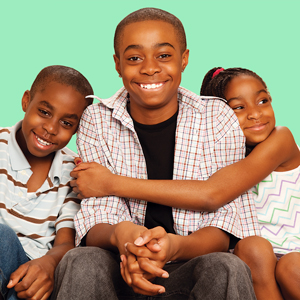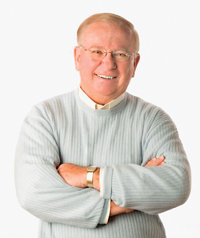 My boys were pumped. A birthday party and a rock-climbing adventure all in one. They had talked about it for days. On the way to the party, they giggled about who was going to race to the top the fastest and how high each of them would climb.
My boys were pumped. A birthday party and a rock-climbing adventure all in one. They had talked about it for days. On the way to the party, they giggled about who was going to race to the top the fastest and how high each of them would climb.
I should have known it wouldn’t pan out as planned. My oldest, Brady, started to look really nervous once they put the helmet on him. Meanwhile, Eli was all the way to the top before the staff could even strap the harness on his big brother.
Fast-forward to the first day of school. Brady is stoically waiting for the bus, carrying the weight of the world on his shoulders and worrying about his younger brother who won’t get out of the road. Eli, it seems, is trying his best to get run over by a two-ton yellow construction vehicle.
This is pretty much how it goes with my two boys. Brady, twenty-two months older than Eli, is almost a mini-adult. He is responsible, worries about his family’s welfare, and loves to make lists. Eli, on the other hand, is the family baby and likes it that way. He has no plans for growing up anytime soon.
That’s birth order for you. It’s been debated for years and is always a fun topic of conversation, amongst us moms and dads especially. But does it really make a difference in the grand scheme of things? Does it really affect who we are in life and who our children will be? There have been studies galore on whether it holds any scientific value and there are still many skeptics. But regardless of the doubters, understanding our little puppies’ order in the litter may help us all to become more insightful and even more aware parents.

Kevin Leman, Ph.D., is one of the country’s leading experts on this topic. His book, The Birth Order Book: Why You Are the Way You Are, has been the go-to guide on birth order since it was first published in 1985. I read the updated 2009 version in one night and annoyed my husband to death each time I came across something we, as parents, could relate to.
“It’s fascinating to watch your little cubs come out of the same den and see what they become,” writes Dr. Leman, who is also the father of five. “But one of the biggest mistakes parents make these days is that they try to treat all of their children the same.” He adds that from day one, his oldest child was a different person than his middle and younger children. “Children sometimes need to be treated differently depending on their place in the family.”
Here is Dr. Leman’s best advice for maneuvering each ring of the birth order ladder.
The Oldest Child
We all know how they are supposed to be: accountable, hard-working, and every bit the perfectionist. The oldest are the ones who get all of their parent’s attention for a few choice years and by the time they are eighteen months, they have a “pure picture of what the world around them is like and what their parents expect them to be,” explains the expert. Dr. Leman also refers to the oldest as “the lab rats of the family,” because essentially, they are. As first-time parents, we are trying everything out on them and they know this. “We also groom firstborns for success and leadership roles in life,” says Dr. Leman.
Ben Garden, a 28-year-old teacher in Chesterfield County and the oldest of three children, agrees with this assertion. “My parents always wanted me to take on more responsibility than I wanted to. I also always wanted to please them,” Ben says. Most of our country’s presidents are firstborns. According to Dr. Leman, firstborns come in two flavors: compliant nurturers or aggressive movers and shakers. Both like to be in control and pay close attention to details. Dr. Leman’s best piece of advice for parenting the oldest child? Let them feel special once in a while because they do hold seniority, and do, by nature, bear most of the responsibility amongst the siblings. “For example, let them stay up a little later than their siblings,” Dr. Leman recommends. The oldest also tends to not like surprises and wants parents to be very specific and precise with them. Leman learned this with his own firstborn. Don’t be vague and tell them that you are going to leave for dinner in “a little while.” Dr. Leman will tell you, “these kids want to know the exact time down to the last second.” This explains why Brady has had a watch since he was four.
The Middle Kid
I think I only had two children because I couldn’t bear the thought of making my fun-loving, life’s-a-blast-every-second baby, into a middle child. I am a middle child, wedged between an over-achieving Stanford law graduate brother and a sister that defined what it meant to be “the apple of our parents’ eye.” Being the Jan Brady of the family is a hard title to have, but Dr. Leman believes the middle kid, in the end, is the one that’s better off than anyone else. Just take a look at the typical traits of a middle child. First, we usually go the completely opposite way of our over-achieving oldest sibling.
Ben’s brother Andy thinks his parents did a great job of not making him feel like the classic “woe is me middle child” but he definitely felt the need to “carve his own space.” Personality wise, he is completely different from his brother. According to Dr. Leman, this is typically what happens when the second child is the same sex as the oldest sibling. Middle children also tend to be “the peacemakers” and typically have no trouble making and keeping friends. I like that we middle kids are undeniably loyal and easygoing with our “go-with-the-flow” selves. Usually we leave the safe perimeters of our family and make close relationships outside of the family. Middles are creative and eager to make everyone happy. We can also be the hardest to define. Middle children can become frustrated because they want their opinions valued just as much as those of older siblings. The biggest mistake parents of middles make? Not asking them their opinion. “A middle child never, ever hears ‘darling, what do you think of this?’” states Dr. Leman. “They need to know they are as valued and as important as their older and younger siblings.”
The Baby
Dr. Leman, a baby himself, refers to these tots as “the world’s cheerleaders.” Extroverts to the core, they crave attention and take the most risks. Ben’s youngest sibling, his sister Kate, just got back from living in Guatemala for a year. “She is absolutely the risk-taker of our family.” Ask most comedians when they were born and most of the time, it’s last in the birth order. As mom and dad’s last child, rules and structure may go out the window all together with the prince or princess of the family. Parents are tired once their last baby rolls into the home base. Plus with their outgoing, vivacious personalities, everything they do is just so darn cute.
What should we not do while parenting the youngest? “Don’t let them manipulate you,” says Dr. Leman, “because they will try every chance they get.” My baby sister actually manipulated my parents into letting her stay out of preschool one extra year. I’m still not over that one. According to Dr. Leman, parents should make sure the babies have responsibilities of their own to teach them life is not always a party. “The oldest one shouldn’t always be the one to take out the trash,” advises Dr. Leman. “They can grow up with the expectation that life is all about having a good time and may be let down once reality kicks in.”
The Only Child
Onlys make the world go round. Much like firstborns, they are organized, conscientious, and always dependable. Responsibility is something that comes naturally to them. According to Dr. Leman, “They are little adults by seven or eight. They can also be unforgiving, demanding and hate to admit they’re wrong. Onlys carry their hearts on their sleeves and can be very sensitive.” As perfectionists they sometimes get overwhelmed with reaching that “high bar for everything.” Dr. Leman advises onlys and parents of onlys to make sure they “lower that high bar jump on life and settle for just trying their best.”
Finally, advises Dr. Leman, reflect on your own birth order as a parent. Oldest children might place too much responsibility on their own oldest child while a baby might let their baby get away with almost anything. Dr. Leman himself was guilty of babying the baby in his family and thinking everything the child did – good or bad – was just the greatest thing ever. “Not until my wife pointed it out, did I even realize what I was doing.”
As for my parenting and what I’ve learned from talking with this expert on birth order? I think it’s Eli’s turn to take out the trash.



